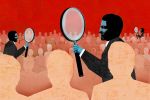Helen Keller once said, "Alone we can do so little; together we can do so much." Those who maintain the power structures of the academy, and particularly the humanities, might reply that of course Helen Keller would say such a thing. If they didn't say it out loud, they'd at least imply that collaboration is helpful only to those whose infirmities and weaknesses make it impossible for them to stand on their own—those people really need help. But not so in the humanities! Where we all lift our own weight, and all of us speak in our own, strong voices.
After all, the Delphic oracle didn't need a co-author. In the end, Socrates was perfectly happy defending himself. Diogenes' barrel had a decidedly single occupancy. And Descartes's Meditations were his meditations, his and his alone. Some academics might suggest that the longevity of the humanities—from philosophy to classics to literature—is, in fact, a testament to the power and effectiveness of perfectly alienated brilliance. So perhaps Keller was wrong about the necessity of working together.
Collaboration in the sciences makes good sense: Two of us can see more, and more clearly, than one of us can. Together we can correct one another's work, share our experience, and if all goes well, advance human knowledge. But ask a tenure-and-promotion committee just about anywhere in the United States, and you'll learn that admitting to collaboration in the humanities is like admitting to doping in the Tour de France. Everyone does it, but woe to the one who is caught.
You would think we'd know better. We are, after all, paid to dwell in texts that remind us that "it is not good for the man to be alone." (In case you don't recognize it, this is from the Genesis creation myth; after God pronounces creation very good, this is the first thing God declares to be not good. Selah.)
Goethe's Faust restates the problem of academic isolation in a way that is particularly apposite. Faust, like many of us in the humanities, is incredibly good at making his scholarly pirouettes. All of these performances are masterfully executed, but his apparent success depends on a disturbing fact, namely that these solo performances matter so painfully little to the outside world. Faust's study looks a bit like ours—a small, darkly lit, book-filled, mausoleum-for-one. And as we work by ourselves, we may, in our quite moments, admit, as Faust does, "Here now I stand, poor fool, and see / I'm just as wise as formerly." Such admissions may sometimes reach the threshold of consciousness, but rarely remain there very long.
So it can be hard to remember that the Delphic oracle was not one person but a community of people in collaboration. Diogenes was nothing without an audience; his barrel was not for him alone. Descartes's meditations were, in the end, a modification of Augustine's Confessions, mediated by Anselm. (Who said "I think, therefore I am" first? Yes, that was Augustine.)
No one works alone. It's just a question of degrees of solitude. We moderns pride ourselves on our Enlightenment, on having broken the shackles of pre-modern religion, but it's not plain we've broken them all, or that the "breaking" hasn't really just been an exchange.
Academic life in the humanities still bears the form, if not the detail and substance, of the monastic life that shaped the modern university. Our offices and library cubicles are like cells, places to which we retreat so that we can "read, read, read, work, pray, and read again," as the philosopher Charles Peirce put it back in 1877, quoting an old chemist's maxim. Our graduate-school training habituates us in burying ourselves for long hours in solitary seeking, emerging only for the austere hours of communal liturgy, where most of us sit in silence while one chosen from among us stands and reads from the holy text. The main difference between us and the medieval monastics is that they, when they went into solitude, believed they were not alone. We moderns decidedly are.
In his verse autobiography, Thomas Hobbes mentions a priest named Mersenne multiple times, each time very favorably. This is a little surprising, since Hobbes seems like the last person you'd expect to find praising a Catholic priest. Mersenne taught at the University of Paris, and Hobbes met him while Hobbes was in exile in the 1640s.
The reason for Hobbes's high praise? Mersenne was a man who believed in collaboration. He was a minor philosopher and mathematician, but today we remember him not for those contributions but because he corresponded with the great minds of his day, and helped them to learn from one another. For example, hearing that Huygens was trying to find a way to keep regular time, Mersenne told him about Galileo's work on the regular oscillation of pendulums, and the pendulum clock was born. The saying of the day was "If you want to tell Europe, tell Mersenne." Apparently, he believed his job was not necessarily to promote his own career but to help human knowledge to flourish. And he was willing to overlook differences of creed, politics, and language to pursue that aim.
We'd be sure not to give him tenure today.
It took Helen Keller 33 years to acquire a voice that could speak to the public. That is only slightly longer than it takes most graduate students in the humanities to lose theirs. It is not that those students can't find it; they pointedly choose not to. Today we have generally lost sight of something that Keller saw very clearly: Genuine communication, rather than personal notoriety or individual survival, should be the ultimate object of our work in the humanities. She also recognized that this communication stuff is incredibly hard.
Cultivating a voice—one that is both sophisticated and understandable—takes an enormous amount of practice. And it requires more than a little humility (which both of us are still working on). We have to actually care when others don't grasp our point. Miscommunication is not a function of others' ineptitude, but a reflection of our own. That may not always be the case, but it is unequivocally possible. And we have the choice to consider this possibility seriously. Doing so might mean that we begin to collaborate and discover a voice that is worth being listened to. We cannot do this by ourselves. It is not good to be alone.








